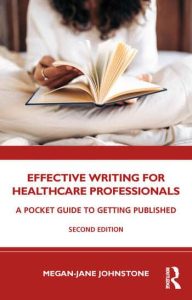Best-selling academic author and retired Professor of Nursing Megan-Jane Johnstone has released a book aimed to help nurses, midwives and students to write and publish about their vital experiences so that others may learn.
Whether writing letters to the editor, case studies, articles for professional journals and newsletters, blogs or social media, the opportunities to publish nowadays are endless.
“I never imaged I would be the author, co-author or curating editor of 19 scholarly books, not to mention numerous book chapters, journal articles, commentaries,” Dr Johnstone said.
“Nursing has given me the opportunity to be a successful author and I hope, through my work, I have been able to give back to it.”
But how do you get published? Where do you start? How do you know if your writing is good enough, and what can you learn to make it better?

This new edition of Effective Writing for Healthcare Professionals: A Pocket Guide to Getting Published is an invaluable insider’s guide to publishing, providing tips and advice for time-poor professionals working in the healthcare sector. It is aimed for novice writers and healthcare providers interested in publishing their work.
“The idea to write the book and its compilation is a response to the many colleagues, associates, and students who – over the past several years – have asked for advice on how they might begin a writing career and succeed as authors,” Dr Johnstone said.
“I hope the revised edition of this book will encourage busy nurses and midwives in all areas and levels of practice be they clinicians, administrators, and educators to publish their vital experiences so that others may learn.
Dr Johnstone published her first scholarly journal article in 1984. However, it wasn’t until she started her academic career in 1987 that she began focusing seriously on her writing career.
“People would say to me you should publish. I would say: ‘I’m not ready’. But they would counter: ‘If you wait, you’ll never feel ready, you’ll never publish.’
“I mirror that advice back now. If you think you have something worth saying, get writing. And if you think one of your colleagues has something to share, tell them: ‘you could write about that. You’ve got something to say here’.”
Offering an accessible guide to the key issues, this book may help those who find the process of writing challenging. It covers issues ranging from getting started to the winning habits of successful authors; from the rights and responsibilities of authors, to how to get noticed.
Unfortunately, many would-be writers in the healthcare professions – especially busy direct care providers and administrators, junior academics with high teaching loads, and students – are often intimidated by the thought of writing and become their own instruments of discouragement.
“The primary aim of this book is to overturn this ‘writing block’ and to guide aspiring authors in the healthcare disciplines towards becoming their own mentors and instruments of encouragement and success,” said Dr Johnstone, clarifying that aspiring authors must, however, also have the “will to write”.
“If you genuinely have the will to write and aren’t doing it because you cannot get there or you don’t think you’re good enough, this book can help guide the way to write.”
The new edition has been updated to include guidance on publishing norms, collaborative digital platforms, social media, and the impact of the COVID-19 pandemic on publishing trends.
Healthcare professionals can make a difference to the world in which they live and work by publishing their work in a range of media including professional journals, academic and professional books, reports, social media, weblogs, professional newsletters, and the mass-circulation media.
“Choose topics you would like to publish on – and don’t take the easy route. If you’re writing a conference paper – write a manuscript that is ready for submission to a journal, not just slides for PowerPoint. Writing conference abstracts are also good practice as they encourage clear, concise writing with a word limit,” Dr Johnstone said.
Publishing in nursing has improved exponentially over the past 120 years, argues Dr Johnstone.
“When nursing was being established as a profession of women, for women, by women circa 1860s, publication by nurses was rare – with the notable exception of the prolific writings of Florence Nightingale and other leaders such as UK Ethel Bedford Fenwick and US Lavinia Dock (co-founder of the ICN in 1899).

“Initially only nurse association journals were published as mainstream nursing journals (eg. the American Journal of Nursing established in 1900 which later became the official journal of the American Nurses Association (ANA); and the first Australian nursing periodicals the Australasian Nurses Journal (ANJ) (established March 1903, and the official journal of the Sydney-based Australasian Trained Nurses Association (ATNA) and Una (established April 1903, the official journal of the Victorian Trained Nurses Association (VTNA)”, now the Australian Nursing and Midwifery Journal (ANMJ) and the official journal of the ANMF.
Nurses were often forbidden to publish when employed as a nurse and could even be disciplined for doing so, Dr Johnstone said.
“The publishing agenda shifted with the move of nurse education into the higher education sector. Today there are over 250 listed nursing journals with Web of Science journal ranking (JCR) in which nurses can publish.
“Scholarship in nursing has never been better with Australian nurse authors ranking among the worlds’ best in the field.”
Publisher Routledge is offering ANMJ readers a 20% off the purchase price for advanced orders of Effective Writing for Healthcare Professionals: A Pocket Guide to Getting Published until 31 December 2023.
Please note that this discount code cannot be used in conjunction with any other offer or discount and only applies to books purchased directly via www.routledge.com. This code expires on 31 December 2023.
Megan-Jane Johnstone AO is a retired professor of nursing who now writes as an independent scholar. She is the author of several books including Alzheimer’s Disease, Media Representations and the Politics of Euthanasia: Constructing Risk and Selling Death in an Ageing Society (also by Routledge), and Bioethics: A Nursing Perspective (by Elsevier).









